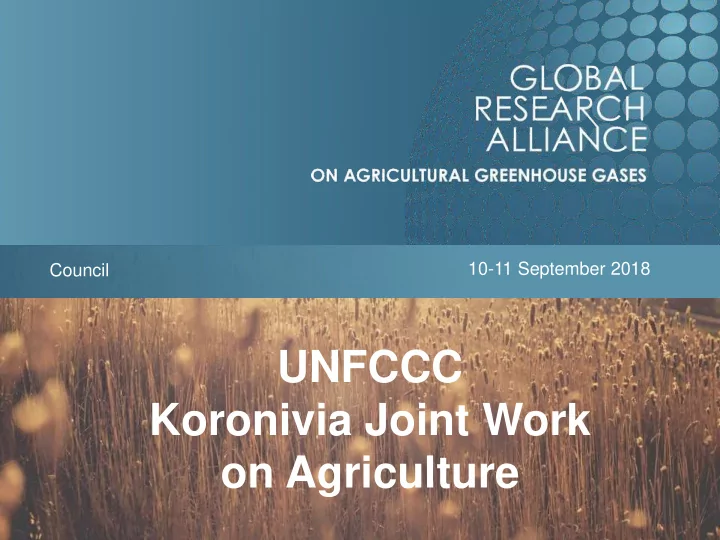

10-11 September 2018 Council UNFCCC Koronivia Joint Work on Agriculture
Koronivia joint work on agriculture • COP23 November 2017 adopted a decision called Koronivia joint work on agriculture • Decision requested the Subsidiary Body for Scientific and Technological Advice (SBSTA) and the Subsidiary Body for Implementation (SBI) to jointly address issues related to agriculture • SBSTA is the body of the UNFCCC responsible for dealing with scientific and technical issues relating to climate change and its effects, technology, international cooperation in research and development, capacity building, amongst other things • SBI is the body of the UNFCCC charged with dealing with implementation of Parties’ commitments/actions, including their reporting of greenhouse gases (GHG Inventories) and policies and measures (National Communications, NDCs).
Koronivia joint work on agriculture (KJWA) Advancing previous work: (a) Modalities for implementation of the outcomes of the five in-session workshops on issues related to agriculture and other future topics that may arise from this work; New substantive work: (b) Methods and approaches for assessing adaptation, adaptation co-benefits and resilience; (c) Improved soil carbon , soil health and soil fertility under grassland and cropland as well as integrated systems , including water management ; (d) Improved nutrient use and manure management towards sustainable and resilient agricultural systems; (e) Improved livestock management systems; (f) Socioeconomic and food security dimensions of climate change in the agricultural sector
First meeting on KJWA • SBSTA and SBI met in Bonn during first two weeks of May. • Reached agreement to a KJWA Road Map to implement elements of the KJWA COP23 decision • Provides certainty about timing of addressing the various elements of the COP23 KJWA decision • Allows Parties to turn attention to the substantive work to be done
KJWA Road Map Results expected until 2020 (COP 26) • Parties and observers to submit on following thematic topics: • Methods and approaches for assessing adaptation, adaptation co-benefits and resilience and improved soil carbon, soil health and soil fertility under grassland and cropland as well as integrated systems, including water management by 6 May 2019 . • Improved nutrient use and manure management towards sustainable and resilient agricultural systems by 30 September 2019 . • Improved livestock management systems, including agropastoral production systems and others, and socioeconomic and food security dimensions of climate change in the agricultural sector by 20 April 2020 . • Other topics by 28 September 2020. • Workshops to be conducted on each of the above topics at sessions of SBSTA and SBI immediately following date of submissions.
GRA supporting the KJWA • GRA can make relevant information available to the KJWA through member countries including information in their Parties submissions • GRA can work with its partners, e.g. FAO, CGIAR/CCAFS, CCAC, to make relevant information available in submissions by these observers • GRA Council should decide, if and - if yes - how GRA is able to support the Koronivia process most efficiently.
Thank you very much for your attention Any questions?
Recommend
More recommend